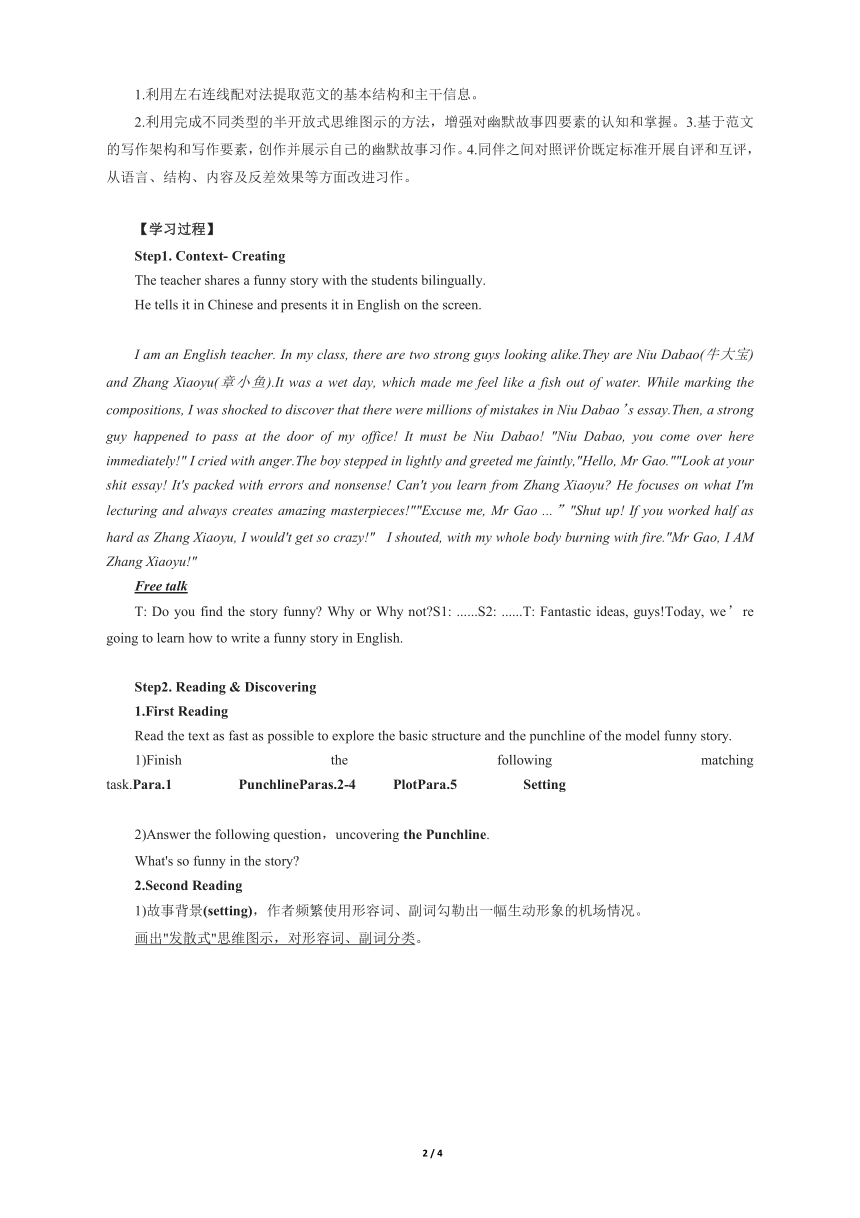北师大版(2019)选择性必修第二册 Unit 4 Humour Writing Workshop 教学设计2
文档属性
| 名称 | 北师大版(2019)选择性必修第二册 Unit 4 Humour Writing Workshop 教学设计2 |

|
|
| 格式 | docx | ||
| 文件大小 | 604.6KB | ||
| 资源类型 | 教案 | ||
| 版本资源 | 北师大版(2019) | ||
| 科目 | 英语 | ||
| 更新时间 | 2023-03-16 18:20:29 | ||
图片预览


文档简介
U4写作课 A Funny Story
【学习主题】
本课为本单元的写作课,通过呈现一则幽默故事的范文让学生学习如何写故事,属于“人与社会”主题。学生通过撰写幽默小故事,能回顾生活中的趣事,并与其他同学分享快乐。
【范文文本分析】
What
本写作范文讲述了一个发生在机场的幽默故事。一位乘客因飞机被取消而怒气冲冲地插队并要求优先办理,工作人员表示需要排队按先后顺序安排,但这位乘客非常傲慢,最后工作人员运用幽默,机智地化解了问题,使不文明的行为受到嘲笑。故事结尾通过"Do you know who I am "的一语双关达到出人意料、引人发笑的幽默效果(punchline)。
How1.
本课为幽默故事,体裁属于记叙文。
幽默故事的行文特点是整体短小精悍,内容呈现四个要素。幽默故事一般由四个部分构成(或SCPP四要素)。
1)故事背景(setting),作者频繁使用形容词、副词勾勒出一幅生动形象的机场情况。
2)故事人物(characters),作者使用清晰的语言对话刻画人物性格,塑造人物性格或人物印象的反差,形成鲜明对比。
3)故事情节(plot),作者通过先抑后扬或先扬后抑的叙事手法,让思维流合乎逻辑、合乎常规认知、易于为人接受。
4)幽默效果(punchline),故事结尾通过对"Do you know who I am "的非常规回答,抖出出人意料的“包袱”。
2.本课为幽默故事,叙事时态和叙事手法鲜明。
1)主体时态单一:陈述部分的一般过去时态和引述部分一般现在时态。
2)叙事手法细腻:用形容词、副词刻画环境和人物
3)情节设计凸显反差:demanded the man angrily VS the young agent replied angrily
Why
作者希望学生通过学习本课,掌握幽默故事的构成要素、语言特点以及笑料设计。鼓励学生学会写幽默故事,讲幽默式对话,增强幽默感,和谐人际关系、给他人带来欢乐,从而积极、乐观地面对生活。
【学习目标】
1.获取、归纳幽默故事的基本信息及笑点所在;
2.解构幽默故事范文的基本写作要素;
3.运用创造反差的方法创作一则细节丰富的幽默故事。
【评价任务】
1.利用左右连线配对法提取范文的基本结构和主干信息。
2.利用完成不同类型的半开放式思维图示的方法,增强对幽默故事四要素的认知和掌握。3.基于范文的写作架构和写作要素,创作并展示自己的幽默故事习作。4.同伴之间对照评价既定标准开展自评和互评,从语言、结构、内容及反差效果等方面改进习作。
【学习过程】
Step1. Context- Creating
The teacher shares a funny story with the students bilingually.
He tells it in Chinese and presents it in English on the screen.
I am an English teacher. In my class, there are two strong guys looking alike.They are Niu Dabao(牛大宝) and Zhang Xiaoyu(章小鱼).It was a wet day, which made me feel like a fish out of water. While marking the compositions, I was shocked to discover that there were millions of mistakes in Niu Dabao’s essay.Then, a strong guy happened to pass at the door of my office! It must be Niu Dabao! "Niu Dabao, you come over here immediately!" I cried with anger.The boy stepped in lightly and greeted me faintly,"Hello, Mr Gao.""Look at your shit essay! It's packed with errors and nonsense! Can't you learn from Zhang Xiaoyu He focuses on what I'm lecturing and always creates amazing masterpieces!""Excuse me, Mr Gao ...”"Shut up! If you worked half as hard as Zhang Xiaoyu, I would't get so crazy!" I shouted, with my whole body burning with fire."Mr Gao, I AM Zhang Xiaoyu!"
Free talk
T: Do you find the story funny Why or Why not S1: ......S2: ......T: Fantastic ideas, guys!Today, we’re going to learn how to write a funny story in English.
Step2. Reading & Discovering
1.First Reading
Read the text as fast as possible to explore the basic structure and the punchline of the model funny story.
1)Finish the following matching task.Para.1 PunchlineParas.2-4 PlotPara.5 Setting
2)Answer the following question,uncovering the Punchline.
What's so funny in the story
2.Second Reading
1)故事背景(setting),作者频繁使用形容词、副词勾勒出一幅生动形象的机场情况。
画出"发散式"思维图示,对形容词、副词分类。
2)故事人物(characters),作者使用清晰的语言对话刻画人物性格,塑造人物性格或人物印象的反差,形成鲜明对比。
画出"对比式"思维图示,凸显反差与对比。
3)故事情节(plot),作者通过先抑后扬或先扬后抑的叙事手法,让思维流合乎逻辑、合乎常规认知、易于为人接受。
画出"线条式/进阶式"思维图示,探究故事发展线。
Step3. Writing PracticeCreate a similar essay.
Step4. Presentation
Step5. Peer assessment
Step 6. Homework
Polish the essay.
【教学反思】
Can the student create a funny story with typical features
Are you satisfied with their works If not, what areas need improving
1 / 4
【学习主题】
本课为本单元的写作课,通过呈现一则幽默故事的范文让学生学习如何写故事,属于“人与社会”主题。学生通过撰写幽默小故事,能回顾生活中的趣事,并与其他同学分享快乐。
【范文文本分析】
What
本写作范文讲述了一个发生在机场的幽默故事。一位乘客因飞机被取消而怒气冲冲地插队并要求优先办理,工作人员表示需要排队按先后顺序安排,但这位乘客非常傲慢,最后工作人员运用幽默,机智地化解了问题,使不文明的行为受到嘲笑。故事结尾通过"Do you know who I am "的一语双关达到出人意料、引人发笑的幽默效果(punchline)。
How1.
本课为幽默故事,体裁属于记叙文。
幽默故事的行文特点是整体短小精悍,内容呈现四个要素。幽默故事一般由四个部分构成(或SCPP四要素)。
1)故事背景(setting),作者频繁使用形容词、副词勾勒出一幅生动形象的机场情况。
2)故事人物(characters),作者使用清晰的语言对话刻画人物性格,塑造人物性格或人物印象的反差,形成鲜明对比。
3)故事情节(plot),作者通过先抑后扬或先扬后抑的叙事手法,让思维流合乎逻辑、合乎常规认知、易于为人接受。
4)幽默效果(punchline),故事结尾通过对"Do you know who I am "的非常规回答,抖出出人意料的“包袱”。
2.本课为幽默故事,叙事时态和叙事手法鲜明。
1)主体时态单一:陈述部分的一般过去时态和引述部分一般现在时态。
2)叙事手法细腻:用形容词、副词刻画环境和人物
3)情节设计凸显反差:demanded the man angrily VS the young agent replied angrily
Why
作者希望学生通过学习本课,掌握幽默故事的构成要素、语言特点以及笑料设计。鼓励学生学会写幽默故事,讲幽默式对话,增强幽默感,和谐人际关系、给他人带来欢乐,从而积极、乐观地面对生活。
【学习目标】
1.获取、归纳幽默故事的基本信息及笑点所在;
2.解构幽默故事范文的基本写作要素;
3.运用创造反差的方法创作一则细节丰富的幽默故事。
【评价任务】
1.利用左右连线配对法提取范文的基本结构和主干信息。
2.利用完成不同类型的半开放式思维图示的方法,增强对幽默故事四要素的认知和掌握。3.基于范文的写作架构和写作要素,创作并展示自己的幽默故事习作。4.同伴之间对照评价既定标准开展自评和互评,从语言、结构、内容及反差效果等方面改进习作。
【学习过程】
Step1. Context- Creating
The teacher shares a funny story with the students bilingually.
He tells it in Chinese and presents it in English on the screen.
I am an English teacher. In my class, there are two strong guys looking alike.They are Niu Dabao(牛大宝) and Zhang Xiaoyu(章小鱼).It was a wet day, which made me feel like a fish out of water. While marking the compositions, I was shocked to discover that there were millions of mistakes in Niu Dabao’s essay.Then, a strong guy happened to pass at the door of my office! It must be Niu Dabao! "Niu Dabao, you come over here immediately!" I cried with anger.The boy stepped in lightly and greeted me faintly,"Hello, Mr Gao.""Look at your shit essay! It's packed with errors and nonsense! Can't you learn from Zhang Xiaoyu He focuses on what I'm lecturing and always creates amazing masterpieces!""Excuse me, Mr Gao ...”"Shut up! If you worked half as hard as Zhang Xiaoyu, I would't get so crazy!" I shouted, with my whole body burning with fire."Mr Gao, I AM Zhang Xiaoyu!"
Free talk
T: Do you find the story funny Why or Why not S1: ......S2: ......T: Fantastic ideas, guys!Today, we’re going to learn how to write a funny story in English.
Step2. Reading & Discovering
1.First Reading
Read the text as fast as possible to explore the basic structure and the punchline of the model funny story.
1)Finish the following matching task.Para.1 PunchlineParas.2-4 PlotPara.5 Setting
2)Answer the following question,uncovering the Punchline.
What's so funny in the story
2.Second Reading
1)故事背景(setting),作者频繁使用形容词、副词勾勒出一幅生动形象的机场情况。
画出"发散式"思维图示,对形容词、副词分类。
2)故事人物(characters),作者使用清晰的语言对话刻画人物性格,塑造人物性格或人物印象的反差,形成鲜明对比。
画出"对比式"思维图示,凸显反差与对比。
3)故事情节(plot),作者通过先抑后扬或先扬后抑的叙事手法,让思维流合乎逻辑、合乎常规认知、易于为人接受。
画出"线条式/进阶式"思维图示,探究故事发展线。
Step3. Writing PracticeCreate a similar essay.
Step4. Presentation
Step5. Peer assessment
Step 6. Homework
Polish the essay.
【教学反思】
Can the student create a funny story with typical features
Are you satisfied with their works If not, what areas need improving
1 / 4
同课章节目录
- Unit 4 Humour
- Lesson 1 What’s So Funny?
- Lesson 2 Why Do We Need Humour?
- Lesson 3 My Favourite Comedian
- Unit 5 Education
- Lesson 1 Enlightening a Mind
- Lesson 2 The Objectives of Education
- Lesson 3 Understanding
- Unit 6 The Media
- Lesson 1 From Page to Screen
- Lesson 2 Questions about Media
- Lesson 3 The Advertising Game
